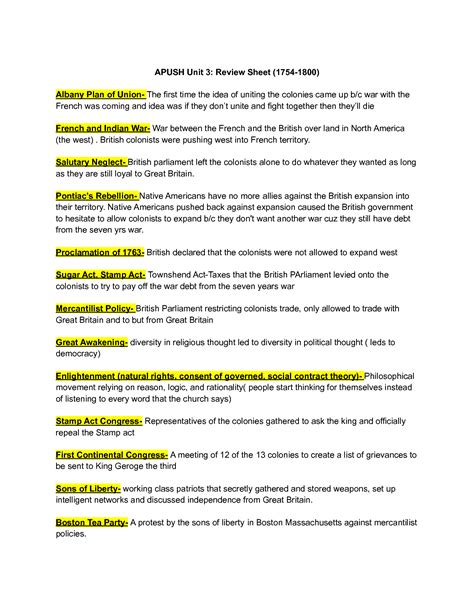Key Concepts
The Colonial Era:
– Ideals and Enlightenment: Rationalism, natural rights, social contract theory
– Mercantilism and Colonial Economy: Economic policies, imperial control, tension
– Great Awakening: Religious revivalism, social change, political activism

The Road to Revolution:
– French and Indian War: Conflict with France, military failures, colonial debts
– Proclamation of 1763: British attempt to control westward expansion, colonial resentment
– Sugar Act, Stamp Act, and Townshend Acts: British taxes on the colonies, resistance
– Boston Massacre and Boston Tea Party: Mounting tensions, breakdown of authority
The Revolution Begins
Declaration of Independence (1776):
– Causes of Revolution: Tyranny, political grievances, Enlightenment ideals
– Key Figures: Thomas Jefferson, John Adams, Benjamin Franklin
– Declaration of Rights: Natural rights, social contract, revolution justified
Military Conflict:
– Revolutionary War: British vs. Patriot forces, battles and skirmishes
– Key Battles: Lexington, Saratoga, Yorktown
– Foreign Aid: France, Spain, Netherlands support the Patriots
– Treaties: Treaty of Paris (1783), recognized American independence
The Creation of a New Nation
Articles of Confederation:
– Weak Central Government: Limited powers, states’ rights
– Weaknesses: Inability to regulate trade, enforce laws, raise funds
Constitutional Convention:
– Purpose: Revise Articles of Confederation, create a stronger government
– Key Figures: George Washington, James Madison, Alexander Hamilton
– Great Compromise: Two-house legislature (Senate vs. House of Representatives)
The Constitution
Ratification and Federalists vs. Anti-Federalists:
– Arguments For and Against: Power of central government, states’ rights
– The Federalist Papers: Influential essays supporting ratification
Key Provisions:
– Structure: Three branches (executive, legislative, judicial)
– Powers of Congress: Declare war, regulate commerce, tax
– Bill of Rights (1791): First ten amendments, protecting individual rights
Establishing a New Government:
– George Washington as First President: Creation of cabinet, establishment of federal courts
– Whiskey Rebellion: Test of federal authority, use of military to quell uprising
